Creating Legal Protections for the More-Than-Human World
The solutions to the urgent and interconnected ecological challenges of climate change, biodiversity loss, and pollution cannot come from the same mindset that created them. Addressing these simultaneous crises requires fundamentally shifting the destructive, anthropocentric worldview that brought us here. The More-Than-Human (MOTH) Rights Program at NYU School of Law is a unique collaborative initiative working to reimagine this relationship by challenging the legal and philosophical frameworks that place humans above and apart from the rest of the natural world.
The perspectives below offer insight into where and how we can begin that shift. In this issue, we dive into the expansive and inspiring body of work that MOTH Founding Director César Rodríguez-Garavito and his collaborators are engaging in. Watch a riveting keynote address from the Bioneers Conference in which Rodríguez-Garavito reflects on the experience that first introduced him to the Rights of Nature. Learn about the legal pathways for ethical AI in animal research. Listen in on two fascinating projects: a new first-person podcast from South American Indigenous leaders, and join innovative musician Cosmo Sheldrake as he explores the idea of nature as an artist through the creation of the new track “Song of the Cedars,” co-written with the forest itself.
Want more news like this? Sign up for the Bioneers Pulse to receive the latest news from the Bioneers community straight to your inbox.
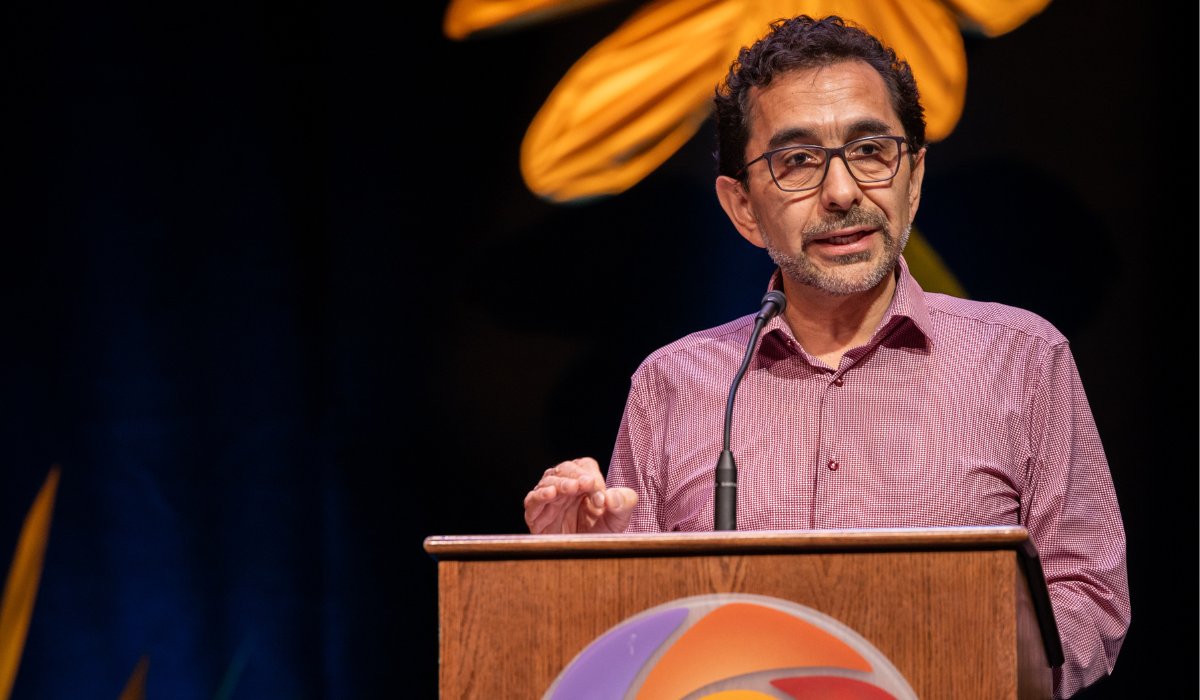
César Rodríguez-Garavito – More-Than-Human Rights: Pushing the Boundaries of Legal Imagination to Re-Animate the World
“The forest is alive. The rivers and the mountains are alive. They are people just like us.” These were the words spoken to César Rodríguez-Garavito by Sabino Gualinga, the shaman of the Sarayaku people of the Ecuadorian Amazon, who had been resisting oil drilling in their territory. Speaking with Don Sabino along the Bobonaza River, Rodríguez-Garavito felt invited to listen to the life all around them. At the time, Rodríguez-Garavito was a human rights attorney, and this was the first time he was introduced to the idea of the rights of nature. It stayed with him, and over time, the idea grew.
Now an Earth Rights scholar, lawyer, and founding Director of the More-Than-Human (MOTH) Rights Program at NYU School of Law, Rodríguez-Garavito has advanced new ideas and legal actions worldwide on issues such as climate justice, Indigenous rights, and what he proposes to call “more-than-human rights,” which are as much a legal proposition as they are a story about our relationship with the more-than-human world. Drawing on his fieldwork and participation in legal actions advancing the rights of nature around the world, Rodríguez-Garavito tells a renewed story about the living world: one in which all of nature is alive; where human and nonhuman animals, plants, fungi, rivers, forests, oceans, and other ecosystems are all animate, subjects of moral and legal consideration, and entangled in the planetary web of life.
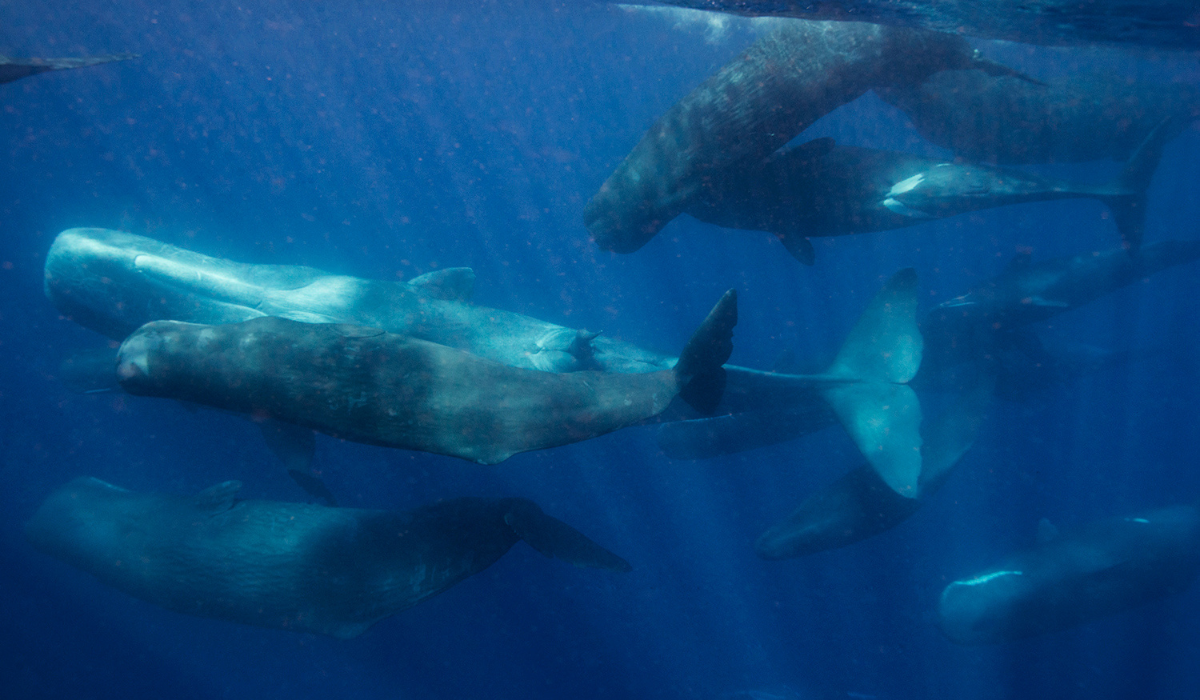
Listening, Not Controlling: A Legal Path for Ethical AI in Animal Research
The idea that nonhuman animals might possess rich, structured languages—complete with dialects, social codes, and meaning—was once, for modern society, the stuff of science fiction. But recent breakthroughs and research from the scientists, including the innovative team at Project CETI (the Cetacean Translation Initiative), who are using advanced AI and gentle robotics to study sperm whale communication, are making that possibility scientifically tangible.
But as science gains the tools to interpret animal language, a deeper question emerges: How do we ensure that listening leads to protection—not control or harm? As we enter this potent new era of potential interspecies understanding, the ethics of how we use this knowledge may be more important than the discovery itself. In this companion article to Project CETI founder David Gruber’s piece on how AI is helping researchers decode whale sounds, César Rodríguez-Garavito, founding director of the More Than Human Life (MOTH) program at NYU, explores the legal and ethical implications of decoding animal communication. Photo by Amanda Cotton
Plus, read more about the work of MOTH and CETI below:
- Researchers are Using AI to Understand what Animals are Saying (TIME)
- Read an exploration from National Geographic of a paper co-authored by MOTH and Project CETI members, “What If We Understood What Animals Are Saying? The Legal Impact Of AI-assisted Studies Of Animal Communication”
- Listening to the more-than-human world: Legal & ethical principles for nonhuman animal communication technologies
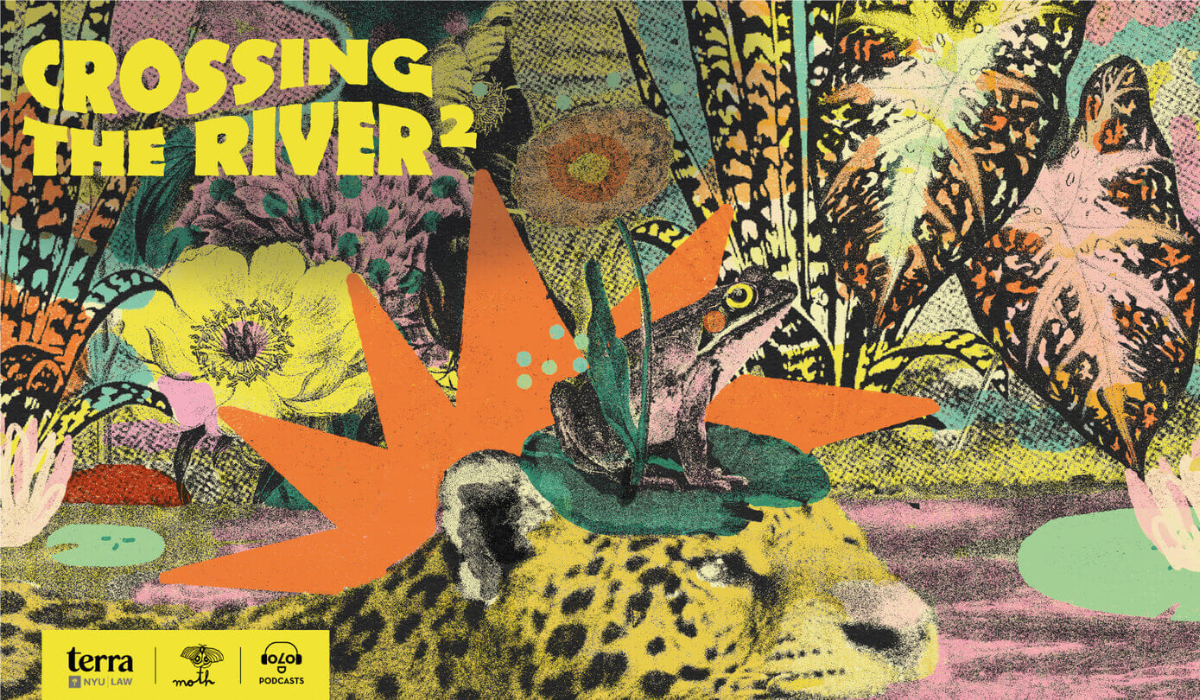
Hear Directly from Indigenous Leaders in the “Crossing the River” Podcast
Despite crossing the river from shore to shore countless times and crafting different strategies to enter into dialogue with Western society, Indigenous leaders in this unique podcast series suggest that the West has not listened carefully enough. “Crossing the River” is a podcast in which we hear from Indigenous leaders who defend life on Earth every day, in their own words, because they are the protagonists of their own stories. To make the collective decisions that will define our present and our future, and to re-examine the stories we tell about our past, the “Crossing The River” podcast series makes the case for listening carefully to their voices.
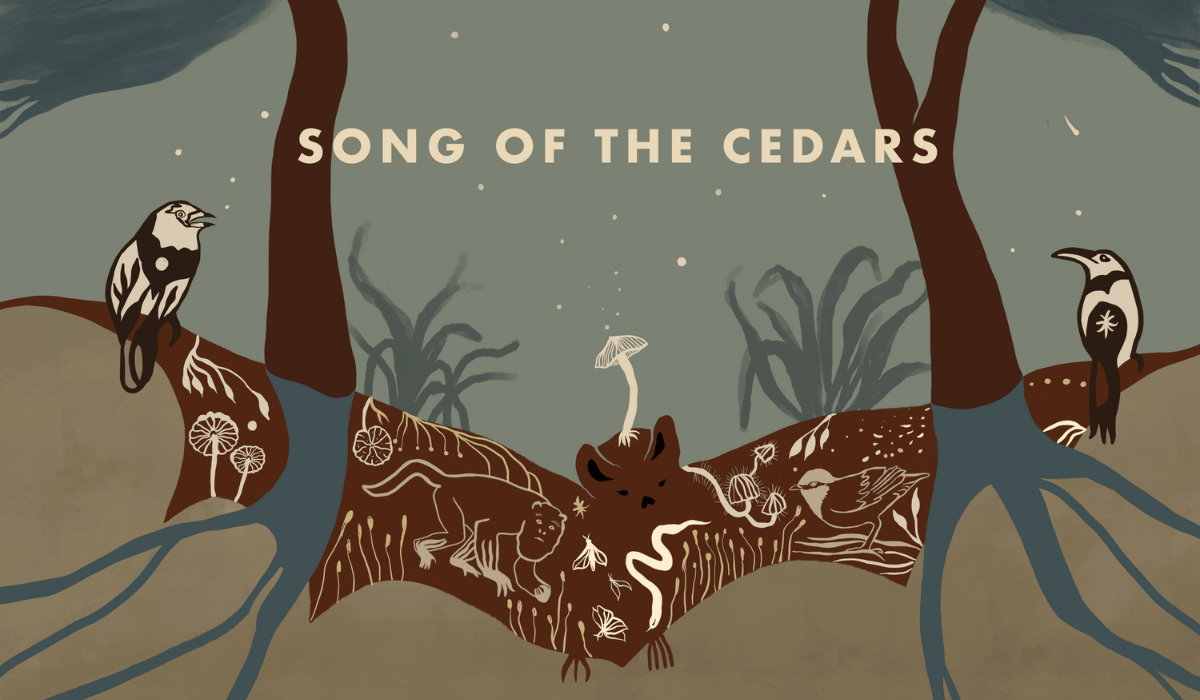
Nature as Artist: Legal Petition Seeks Co-Authorship for Ecuador’s Los Cedros Forest
In a groundbreaking move, the More-Than-Human (MOTH) Rights Program is submitting a petition to Ecuador’s copyright office to recognize the Los Cedros cloud forest as the co-creator of a song titled “Song of the Cedars,” composed in collaboration with musician Cosmo Sheldrake, writer Robert Macfarlane, field mycologist Giuliana Furci, and legal scholar César Rodríguez-Garavito. This will be the first legal attempt to recognise an ecosystem’s moral authorship in the co-creation of a work of art. The song will be available for free download and released on streaming platforms. Any income generated will go directly to the recently established Los Cedros Fund for the protection of the cloud forest. Artwork by Elina Landinez
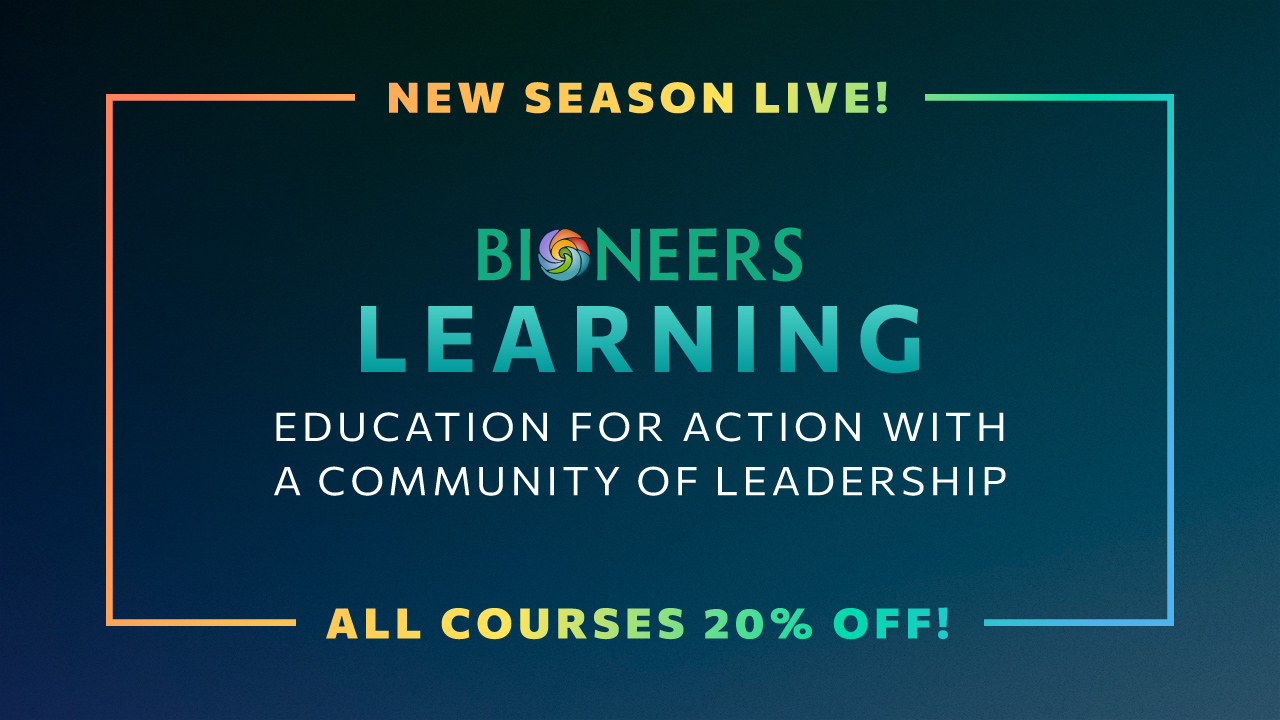
Upcoming Bioneers Learning Courses
Through engaging courses led by some of the world’s foremost movement leaders, Bioneers Learning equips engaged citizens and professionals like you with the knowledge, tools, resources and networks to initiate or deepen your engagement, leading to real change in your life and community. Get 20% off with code VISION20 until June 15, 2025, at midnight PT.
- Embracing Emergence As We Navigate the Winds of Change: Spiritual Teachings Inspired by Hurricane Helene | Sept. 3, 2025, 10:30 a.m.-1:30 p.m. PT | In this three-hour seminar, Zen teacher and spiritual activist Deborah Eden Tull invites us into an embodied exploration of presence, resilience, and sacred relationship.
- Fierce Vulnerability: Healing from Trauma, Emerging through Collapse | Sept 8-29, 2025 | This four-week interactive course offers a radical approach — merging nonviolent action, trauma healing, and spiritual practice to build movements rooted in connection and resilience.
- From Reactivity to Resilience: Responsive Leadership and Fractals of Healing | Sept 13-Oct 18, 2025 | Grounded in ReParentive® Therapy, this six-week interactive course explores how healing intergenerational trauma ripples outward to inspire change in relationships, communities, and systems. You will explore practical tools to regulate your nervous system, heal trauma, and discover how to lead from an embodied, authentic place. Pending approval, this course will offer Continuing Education Credit for therapists and other mental health professionals.
- Exploring the Resurgent Power of the Yin: Tao Te Ching Guided Reading Series | October 8–29, 2025 | In this four-week guided reading series, artist and spiritual-political practitioner Sonali Sangeeta Balajee and Ginny McGinn, Zen practitioner and process designer, invite us to explore the Tao Te Ching (Ursula K. Le Guin’s rendition) as a sacred companion for these hyper-Yang times.
- Putting Biomimicry Into Action in Your Profession and Life | Oct. 9-30, 2025 | Led by Andrew Howley, Chief Editor of the Biomimicry Institute, this four-week interactive course will equip you with the tools to reframe challenges through nature’s lens and turn inspired ideas into action.
- Rights of Nature 201: Moving Campaigns Forward | Nov. 6, 2025, 11 a.m.–2 p.m. PT | Designed as a continuation of Bioneers Learning’s four-week Rights of Nature course, this intensive session focuses on developing and advancing effective campaigns that push Rights of Nature laws forward—locally and beyond.
- Sacred Activism: Meeting our Challenges as Gateways for Cultivating Relational Leadership | Nov. 13-Dec. 11, 2025 | In this four-week live online course, you’ll explore sacred activism as a living practice that draws from your own lived experience, challenges, and discoveries.
- The Four Sacred Gifts: Indigenous Wisdom for Modern Times | Self-Paced | Discover how the Four Sacred Gifts of forgiving the unforgivable, unity, healing, and hope in action provide us with a path to our most grounded, loving, healed, and generous selves.
- Regenerative Agriculture: Nourishing the Soil, Healing the Planet | Self-Paced | Be enlightened on the practical applications and impressive potential that regenerative agriculture has to revive healthy landscapes; contribute to human and animal health; create an equitable food system; and help heal the climate.
